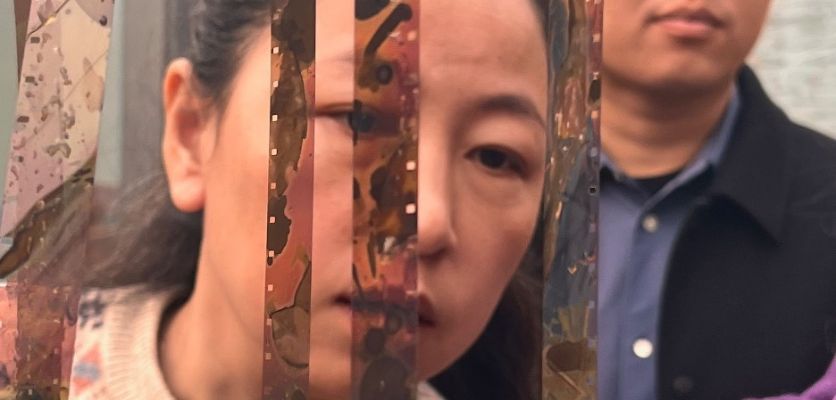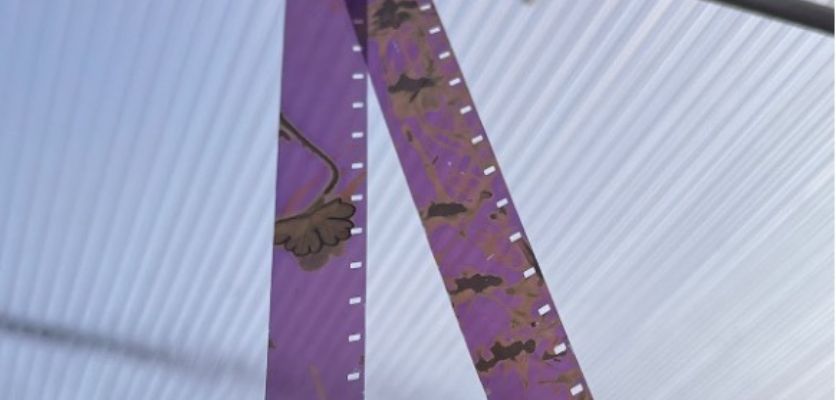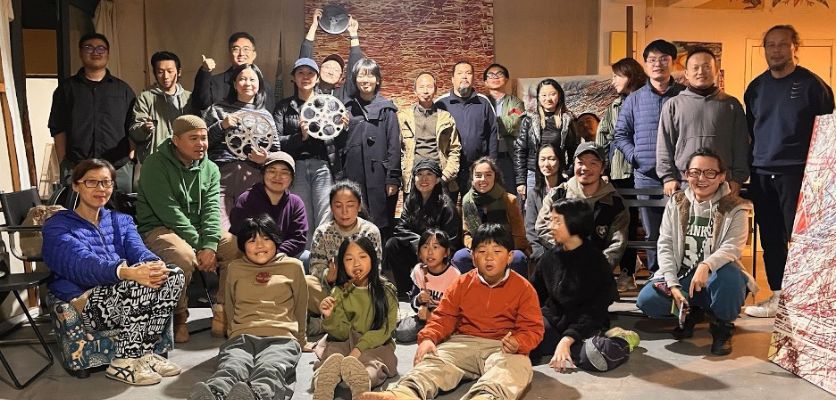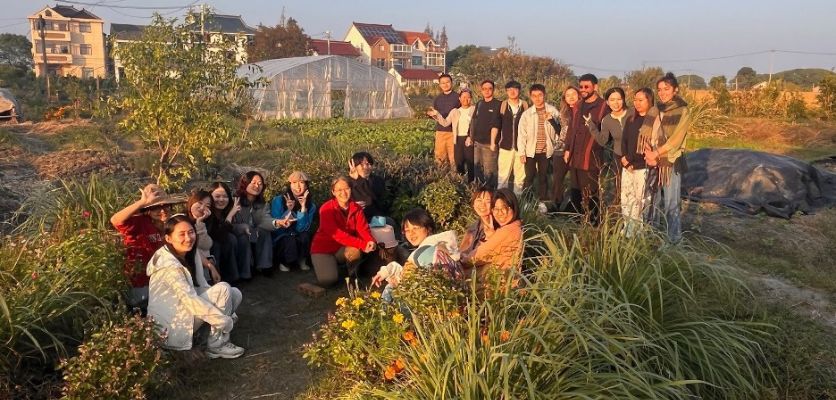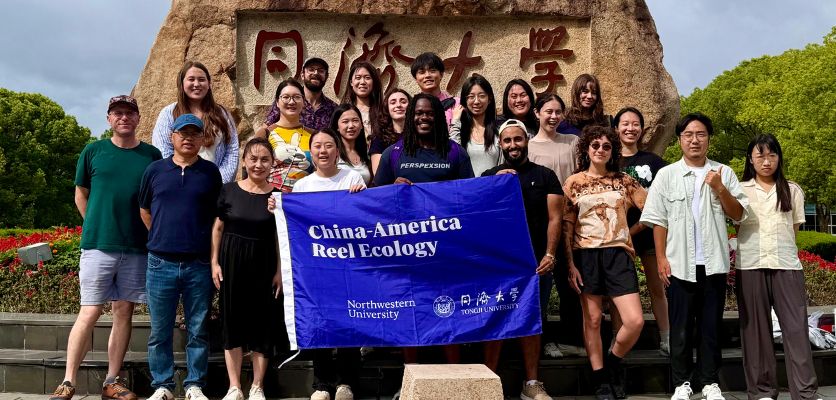Eco-Cinema Across Borders: China-America Reel Ecology Project
A workshop participant examines a phytogram film reel in Shanghai.
With the support of the Cyrus Tang Foundation and two Buffett Undergraduate Research Fellows, filmmaker and anthropologist JP Sniadecki, Professor at Northwestern University’s School of Communication, has launched the China-America Reel Ecology Project (CARE), a curricular program and research project that seeks to innovate at the intersection of art practice and ecological thinking as it forges transcultural connections between artists and students at Northwestern University in Evanston, USA and Tongji University in Shanghai, China.
Sniadecki, who co-led one of the Roberta Buffett Institute’s first Global Working Groups focused on Climate Crisis + Media Arts, has long worked at the intersection of film, ecology, and cultural exchange. He has been an active member of the Chinese documentarian community for decades and has created several films that explore collective experience and sensory ethnography in China. CARE now builds on his previous work to reimagine filmmaking practices in a way that minimizes environmental impact and strengthens artistic and academic ties across international borders.
A Sustainable Vision for Film
Conventional analog filmmaking relies on chemical processing, which can be toxic to the environment and requires careful disposal. Similarly, digital filmmaking depends on precious metals and batteries that damage ecosystems through resource extraction, electronic waste, and pollution from manufacturing. Sniadecki and his collaborators set out to explore eco-processing techniques using non-toxic materials like tea, flowers, and vitamin C to develop 16mm film. By reviving analog filmmaking in an environmentally friendly way, the project offers an alternative to the digital filmmaking standard while fostering artistic expression in local Chinese communities.
Access to analog carries special significance within the historical context of China, where both 35mm and smaller gauges — such as 16mm and 8mm — were not historically available to individuals outside the studio or the state. It was the introduction of digital video in the 1990s and 2000s that enabled the emergence of independent filmmaking across China, and now, with programs such as CARE, both younger and older generations are enjoying the possibilities of working in celluloid.
A phytogram film reel during the development process.
Expanding the Network: Beijing and Shanghai Workshops
The China-America Reel Ecology Project began with a series of workshops bringing together filmmakers, students, and grassroots artists in Beijing and Shanghai to experiment with sustainable film techniques. Supported by the School of Communication's Department of Radio/Television/Film as well as a Global Collaboration Grant from the Roberta Buffett Institute for Global Affairs, these events not only provided training in alternative processing methods but also created space for discussions about analog filmmaking in the digital age.
In Beijing, the China-America Reel Ecology Project welcomed over 35 participants for a workshop hosted in the artist village of Songzhuang. Led in partnership with filmmaker and activist Zhu Rikun, the session introduced participants to phytograms, a technique for creating images on film using only plant-based chemistry. By using local plants and natural materials to create motion pictures, participants explored how sustainable processing can reduce chemical waste while connecting filmmaking to the region’s ecology.
“We translated the phytogram recipe into Mandarin as well as vital context on the historical, material, chemical, and ecological development of celluloid that led up to the creation of the recipe,” said Sniadecki.
Participants in the Beijing workshop at the Songzhuang art village.
Sniadecki organized an additional workshop in Shanghai in collaboration with the Jilu Commune at Cloud Valley, a permaculture farm on the city’s outskirts. Participants learned about and engaged in similar eco-processing techniques and shared a vegan meal sourced from the farm’s produce, reinforcing the connection between their art and local ecology.
“The Roberta Buffett Institute’s support is enabling sustainable art practice and knowledge-sharing at Northwestern’s Evanston campus and locations abroad in China,” said Sniadecki. “It is also fostering a growing network of community members, artists, and scholars to engage with eco-cinema techniques and maintain communication with one another beyond the confines of the workshop.”
Participants in the Shanghai workshop gather at the Jilu commune.
These convenings emerged from an earlier phytogram workshop in August 2024. Organized by filmmakers Christina Nguyen, Assistant Professor of Instruction at Northwestern's School of Communication, and Tristen Ives, formerly Head Projectionist at Northwestern's Block Museum of Art, this workshop took place on Northwestern’s Evanston campus with support from an Earth Rising grant and the Roberta Buffett Institute’s Climate Crisis + Media Arts Global Working Group.
Nguyen emphasized the power of these workshops: “The beauty of phytography and camera-less filmmaking is the accessibility it offers to folks who may not know how to use a camera or have a thorough background in technical filmmaking. The participants can see the film transform in front of their eyes, making magic happen right in front of them. I think the most memorable moment was seeing the participants connect and share excitement over their collaborative film.”
Looking Ahead
Participants are encouraged to submit their original films produced during the 16mm workshops to festivals worldwide to demonstrate the potential of sustainable filmmaking. Plans are also underway to make the films available online and host community screenings for the films at academic institutions across the US and China.
Additionally, these works serve as curricular material for Sniadecki’s new global arts exchange course that links Northwestern students with peers at Tongji University in Shanghai and serves as the core of the CARE program. This collaborative course, led by Sniadecki and professor and filmmaker Li Xiaofeng, connects nine students from each institution to collectively explore the intersection of art and ecology. After meeting remotely during spring quarter 2025, the two cohorts convened in Shanghai and collaborated in groups to produce original film projects.
Northwestern and Tongi students and professors during the summer 2025 CARE convening in Shanghai.
Among the Northwestern cohort was artist naakita f.k., who is entering their second year of the Art, Theory, & Practice Master of Fine Arts Program. “The spring course featured film screenings, talks from visiting artists, equipment workshops, lessons on cross-cultural collaboration and cultural specificities, and more,” explained naakita. “We also collaborated remotely with Tongji University students to draft project proposals. In the summer, we met in Shanghai, pitched our projects to our classmates and professors, and from there set off on our own to film for two and a half weeks.”Projects ranged in type and topic. “We were focused on creating video art rather than a traditional documentary, seeking to experiment with and co-create unconventional ways of storytelling,” said naakita. “Our topic was the last Yangtze soft-shell turtle, located at a zoo an hour or two out of Shanghai. We wanted to film with the turtle but also consider its story as a stand-in for urbanization and environmental destruction, especially within the rapidly developed Shanghai, which was built on a wetland. We filmed in the zoo and surrounding wetlands, doing water sampling, submerging film, and filming from a boat with underwater cameras, for example.”
A screening of the students’ films organized with Northwestern’s Block Museum will take place in 2026. Tongji University will also organize a screening in China. “The whole cohort is encouraged to submit to film festivals, and the collection of films may enter film festival circuits as a capsule collection,” said naakita. “I’m hoping to develop a video art installation version of the film.”
More broadly, the China-America Reel Ecology Project seeks to inspire the next generation of filmmakers and media professionals to incorporate sustainability in their practice. At Northwestern, student Ashley Kim (Medill and Weinberg, ‘25) contributed to the project as a Buffett Undergraduate Research Fellow. She reflects, “I was interested in film arts, environmental sustainability, and policy research, but it wasn't until working with JP Sniadecki that I saw these seemingly disparate interests intersect…In a political climate that places so much emphasis on US-China tensions, JP's focus on partnership through art is particularly meaningful and personally inspiring.”
About the Cyrus Tang Foundation
This project was supported by the Cyrus Tang Foundation, an independent philanthropic organization dedicated to empowering passionate problem solvers to drive positive change in education, healthcare, the arts, and community development, especially in underserved areas related to China. Each grant includes a Giving Back Pledge, encouraging teams to find innovative ways to benefit their communities beyond their projects. The views expressed are those of the authors and do not necessarily reflect the Foundation’s views.
Engage with the Roberta Buffett Institute
Learn more about the Buffett Undergraduate Research Fellowship Program. The faculty project proposal deadline is January 15, and the student application deadline is March 15.
Northwestern faculty can also apply for Buffett Global Collaboration Grants or Buffett Global Working Group funding to further their work with international collaborators.
Graduate students are also encouraged to learn about the Institute’s suite of opportunities and programming, and the public are invited to join us at our upcoming symposia, book talks, and panel discussions.

